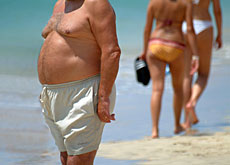European conference tackles growing waistlines

Health ministers from all over Europe, including Switzerland, have signed a charter on counteracting the increasing problem of obesity.
The signing by 53 countries took place during during a conference in the Turkish city of Istanbul on Thursday.
Spreading waistlines are becoming more and more common, with over half of all adults and one in five children in Europe now overweight, according to the World Health Organization (WHO). A third of these people are considered obese.
But the real issue for experts is that excess weight causes one million deaths per year on the continent and affects economic development as well, requiring comprehensive action to fight the growing trend.
Last month, the Geneva-based WHO warned that obesity was reaching epidemic proportions in Europe and that by 2010, there would be 150 million obese adults, or around 20 per cent of the population. “Prevalence of obesity has tripled in the past two decades,” officials said.
Delegates in Istanbul agreed on Thursday to try to make healthy food cheaper and curb junk food adverts aimed at children. Other measures agreed include reducing fat and sugar in manufactured food and improving urban planning to make cycling and walking easier.
National strategy
The charter calls for “economic measures that facilitate healthy food choices” and for regulations to reduce commercial promotion of energy-dense foods and beverages, particularly to children.
Delegates say the fight against obesity is hindered by a lack of evidence as to which methods work, making it trickier than the campaign against tobacco. While governments saw a direct result from increasing tax on tobacco, the impact of changing food prices to spur consumption of healthier products was less clear.
“This (charter) is a first step with something that needs to go much further,” said Thomas Zeltner the head of Swiss Federal Health Office.
Switzerland is no different from the rest of Europe: a quarter of children are overweight, with the figure rising to one in three among adults. Official estimates put the related health costs at around SFr2.7 billion ($2.17 billion) each year.
But the authorities are not underestimating the situation – the issue has been taken seriously for a number of years, according to Hans-Peter Roost of the Federal Health Office.
“There is a steady increase in the number of overweight people in Europe and Switzerland, which is why we are developing a national strategy on diet, physical activity and health to fight obesity,” he told swissinfo.
The government launched the project in 2005, following the lead of the European Union.
Prevention projects
The EU’s action plan brings together the food, retail and advertising industries, as well as consumer organisations and obesity experts. It aims to promote voluntary action against obesity, especially among children.
The Swiss have also launched since the turn of the century a number of initiatives to fight excess weight, such as the Swiss nutrition report, which comes out every five years.
“We have also backed prevention projects such as Swiss Balance, aimed at youngsters and combining nutrition and exercise, and which has been shown to be effective,” added Roost.
The Swiss were actively involved in the preparation of the draft of the European Charter on Counteracting Obesity. Before the conference, there were still wrinkles to be ironed out according to Roost.
“One issue is the balance between personal responsibility and the role of the state,” said Roost. “It is not always easy to strike the right balance, especially when you have to consider how to protect minors.”
swissinfo, Scott Capper
The fifth national report on nutrition published in 2005 says that 37% of the Swiss population are overweight.
Nearly one in five youngsters, aged 15 to 25, eats fast food at least twice a week.
Diseases and health problems related to weight cost SF2.7 billion every year in Switzerland.
In the European Union, up to 27% of men and 38% of women are now considered obese.
Experts say obesity is most frequent among people with lower incomes and less education, who tend to eat more meat, fat and sugar.
Being overweight or obese increases a person’s chances of contracting a condition such as diabetes, heart disease, hypertension, cancer and osteoporosis.
Obesity costs anything between two and eight per cent of a nation’s health budget, according to the WHO.

In compliance with the JTI standards
More: SWI swissinfo.ch certified by the Journalism Trust Initiative










You can find an overview of ongoing debates with our journalists here . Please join us!
If you want to start a conversation about a topic raised in this article or want to report factual errors, email us at english@swissinfo.ch.